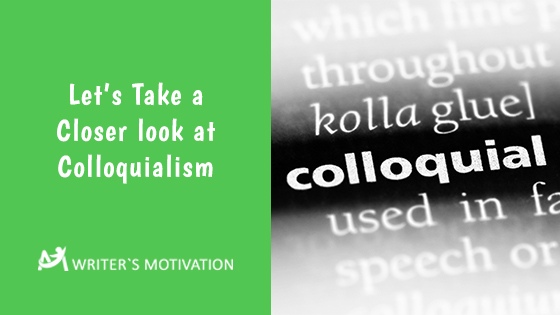Let’s Take a Closer look at Colloquialism

If you want to improve your writing style, you should make sure that you make your writing as multifaceted and immersive as possible. So you should make sure that you are familiar with as many literary devices as possible. One such literary device is Colloquialism.
What is colloquialism?
Colloquialism is a writing literary device, predominantly used for casual communication. It is usually used in informal conversations where the speaker is either relaxed or confident. Although some colloquial terms do use slang, they are not really necessary. Colloquial terms are very versatile, and could be used as contractions or even profanity. A majority of colloquial terms belongs to a regional or national dialect. So if you are going to use colloquial words and terms in your writing, you should know as many as possible. Here are some great examples of Colloquial terms and phrases to get you started.
Common colloquial words:
- Bloke: A British colloquial word for a boy or a man.
- Boot: The British colloquial word for the trunk of a car.
- Kerfuffle: The Canadian term for a difference of opinion that causes trouble.
- Quid: British term for a pound sterling.
- Cheeky: British term for bold or brash.
- Chinwag: British term for having a conversation.
- Gobsmacked: British term for being surprised.
- Gutted: British term for feeling very upset.
- Knackered: British term for being very tired.
- Pea Souper: A British term for a thick fog.
- Lurgy: A British term for an illness with flu-like symptoms.
- Skive: British term for skipping work or school.
- Strop: British term for sulking or being in a bad mood.
- Tosh: British term for a lie.
- Whinge: British term for complaining.
- Smarmy: British term for snobbishness.
- Rubbish: British derogatory term for something untrue or of poor quality.
- Chuffed: British word for being proud or excited.
- Swot: British word for a serious student.
- Blimey: A British exclamation for surprise.
- Anorak: British term for a nerd.
- Arse: British term for a buttocks. It is usually used as a derogatory term.
- Mate: British term for a friend.
- The Tube: British term for a subway.
- Cheers: A British term that could be used as a salutation or goodbye.
- To have a butcher’s: British term to take a look.
- Pencil Crayons: Canadian term for colored pencils.
- Serviette: Canadian term for a napkin.
- Toque: Canadian term for a hat or beanie.
- Skid: Canadian term for a child from a poor family.
- Gong Show: Canadian term for a show or event that gets out of hand.
- Swag: Australian term for a sleeping bag.
- Codswallop: The British colloquial word for a lie or something made-up.
- Dodgy: The British colloquial term for untrustworthy.
- Brolly: British term for an umbrella.
- Posh: British term for classy.
- Ball Park: American term for something very close to accurate.
- Score: American term for gaining what you want.
- Podunk: American term for small town.
- Bludger: Australian term for a lazy person.
- Arvo: Australian term for afternoon.
- Cobber: Australian term for a good friend.
Common colloquial phrases:
- Eat my dust
- Eat my shorts
- Penny-pincher
- Clear as the sky
- Old as the hills
- Tall as trees
- Hit the Jackpot
- Weed or Wade through
- Hit the hay
- Harped on
- Beat around the bush
- Kind of tough
- Hop right in
- Holing up in my room
- Spot on
- Throw someone under the bus
- Hanging out
- Pave a new way
- Time crunch
Conclusion:
Colloquialism may seem like an obscure literary device, however if you want to be a truly complete writer, you will need to be acquainted with as many as possible. Luckily, with this article you’ll be more than acquainted with colloquialism and all its facets.
Recommended Posts







